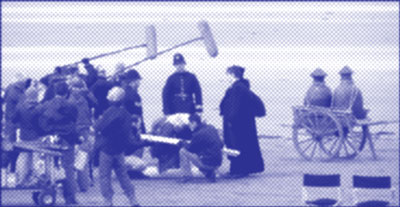
I’ve been catching up on movies lately, and found myself thinking about how much simpler everyday life would be if it followed movie rules.
For one thing, it would be more convenient: in the movies, everyone speaks English. It doesn’t matter what area or era, though with older settings like ancient Greece or Rome, speech is usually delivered — strangely enough — in a British accent. If it’s a question of British English speakers versus American English speakers, then the British-speaking person is invariably either a boor, or evil. And if someone speaks in a non-English language, not to worry — little blocks of text will quickly appear, translating anything that’s actually important.
Think about the ease of scheduling appointments: in films, no one ever says, “I’ll meet you at 5:30 p.m.,” or “I’ll see you at noon.” It’s always “Dinner tomorrow night? Great, see you then.” “Tomorrow night” is a bit vague for most people, but in the movies people never look like they’ve been waiting long. Maybe somewhere there are reels and reels of “waiting-around” footage that got cut in editing, ready to be presented as “extras” on a special edition 4-disc DVD set.
In the movies, there’s no reason you can’t drive while maintaining extended eye contact with your passenger. And if we’re talking about old black and white movies, you can also wiggle, shake, and shimmy that steering wheel like a highly caffeinated monkey, even if you’re just going straight. Don’t get into an accident, though — cars in movies have been found to explode at a rate 100 times higher than non-movie cars.
You’d never have to worry about keeping up with current events; just turn on the radio (or television) for a minute or two each day. Chances are, you’ll time it just right, and the announcer will be discussing something relevant to your situation, usually something that will have a major impact on you within the next half hour. Once in a while, you’ll actually tune into a commercial, or music, or a cartoon, but if you do, that’s good — nothing momentous will be happening anytime soon, and you’re probably safe for a while.
Getting a bartender’s attention is never a problem, either. One flick of an upraised hand will deliver the barkeep like a dog at your heel, no matter how large the crowd. Strangely, the bartender will sometimes know what you want and have your drink ready in hand, without you even saying anything. If you do have to order a beer verbally, it’s simple enough — just say “Gimme a beer.” Don’t worry about hearing a list of 15 tap and bottle choices; there’s no time for that in movies. And if all else fails, just ask for “the usual.”
Also fun is the freedom to turn your back on anyone in the middle of a conversation. It happens all the time in movies, especially during intimate, emotionally charged exchanges: two people, standing at a distance, one background, one foreground, both faces drawn to the camera like magnets. The person in the background always hears everything clearly, though, and never seems offended; what would be rude outside the movies is quite understandable within.
If you’re single and looking, you’d be well-advised to carry some important papers around with you and, whenever you’re in a crowded place, drop them. When you bend down to pick them up, anyone who helps you is a compatible romantic partner. Bonus points if heads bump or hands touch while retrieving the papers. In the movies, dropped papers are the #1 way for future lovebirds to meet and exchange witty banter.
If life were like the movies, it would be easier to take care of yourself, too. For one thing, people in movies are always brushing their teeth. It doesn’t matter if they’re by themselves or in the middle of a conversation, they’ll keep brushing away, even if they have to carry the toothbrush with them into six other rooms. However, despite this dedication to dental hygiene, people in movies rarely, if ever, floss.
Life in the movies isn’t always safe, but there are obvious warnings of impending danger. If you suddenly hear an opera chorus start up, take cover — a gunfight will be erupting soon enough. It’s not quite as common a phenomenon as it was a decade ago, but the basic equation is still there: opera = death. But not always, because in the movies, the bad guys always have bad aim — unless it’s time for a tragic, motivational death to occur, in which case all bets are off. In the same way, if you trip over a root in the woods, you should get up quickly, because there’s probably a serial killer chasing you.
If you do have a medical emergency, don’t worry — it’s likely that upon your arrival at the hospital, a horde of doctors and nurses will descend upon you within seconds, shouting “Get me a defibrillator!“ or “I need 10 cc’s of atropine!” More often than not, these urgent requests will be followed by an equally urgent “STAT!”
Try not to cough, though — unofficial studies show that 95 percent of the people who cough in movies die horribly within the next hour. Because life in the movies is, in a word, dramatic. But not as dramatic as death.

